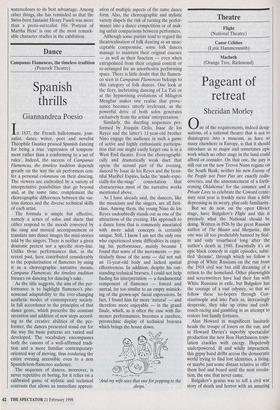Theatre
Flight (National Theatre) Cause Célèbre (Lyric Hammersmith) Macbeth (Orange Tree, Richmond)
Pageant of retreat
Sheridan Morley
One of the requirements, indeed desig- nations, of a national theatre that is not to disintegrate into a museum, as have so many elsewhere in Europe, is that it should introduce us to major and sometimes epic work which no other stage in the land could afford or consider. On that one, the jury is still out on the new Trevor Nunn regime on the South Bank; neither his new Enemy of the People nor Peter Pan are exactly redis- coveries, and the announcement of a forth- coming Oklahoma! for the summer and a Private Lives to celebrate the Coward cente- nary next year is frankly more than a little depressing in its weary, play-safe familiarity.
But we do now, on the open Olivier stage, have Bulgakov's Flight and this is precisely what the National should be doing. Written in 1926 by the great Russian author of The Master and Margarita, this one was all too predictably banned by Stal- in and only resurfaced long after the author's death in 1940. Essentially it's an epic black comedy in eight episodes, subti- tled 'dreams', through which we follow a group of White Russians on the run from the 1918 civil war but still dreaming of a return to the homeland. Other playwrights and screenwriters have had their fun with White Russians in exile, but Bulgakov has the courage of a vast odyssey, so that we follow these no-hopers through Con- stantinople and into Paris as, increasingly desperate, they take up crime and cock- roach-racing and gambling in an attempt to restore lost family fortunes.
Alan Howard in magnificent lassitude heads the troupe of losers on the run, and in Howard Davies's superbly spectacular production the new Ron Hutchinson trans- lation crackles with energy. Hopelessly underpowered, ill and wildly impractical, this gypsy band drifts across the democratic world trying to find lost identities, a living, or maybe just some distant relative to offer them bed and board until the next revolu- tion, the one that never came.
Bulgakov's genius was to tell a civil war story of death and horror with an amazing amount of bleak and black humour; just as we start to feel sorry for these exiles on the run, we are shown how utterly hopeless they will always be at rebuilding any kind of a life. They have left it too late to join a winning team for which they are anyway disqualified by birth, see no point in staying with the losers, but are at the same time unable to survive outside the disciplines of Russia at war with herself. This is a pageant of retreat, about people who wander and lust but cannot deal with wanderlust.
At his Lyric Hammersmith, Neil Bartlett has shown a real if unfashionable interest in the Shaftesbury Avenue past, plays of snobbery-with-violence such as Maugham's The Letter a couple of years ago and now Rattigan's Cause Célebre, completed only weeks before his death in 1977.
The Alma Rattenbury murder case of 1935 had just about everything: glamorous if alcoholic older woman hires likely young lad as chauffeur, and together they end up killing her querulous and inconvenient but rich old husband. The case comes to trial, Alma gets off and duly commits suicide; boy is sentenced to hang but reprieved by public demand as innocent lad misled; he lives now in tranquil Bournemouth retire- ment, well into his eighties.
Rattigan's genius was to see in this well- known trial a whole case history of prewar British social and sexual repression. Neil Stacy and Terry Taplin lead court scenes of nail-biting suspense, while Amanda Harris and Laurence Mitchell are equally well- matched as the killers; there is no better revival of a British play anywhere in London.
We underestimate Sam Walters at our peril; what makes him special is that only Dan Crawford at the ever-imperilled King's Head in Islington has a longer record of running a pub theatre, though since Wal- ters's Orange Tree has now moved across the road it is technically a theatre next to a Pub rather than inside one.
But in the almost 30 years since he founded the Orange Tree, I can only recall one Shakespeare, which makes the Mac- beth that opened there this week all the more intriguing. It has a cast of only ten, and is played on a bare-board stage with virtually no props or identifiable costumes; there is no precise period here, and pre- cious few Scots accents. Indeed, Walters's production starts alarmingly neutrally, threatening a Shakespeare-for-schools effort with the director determined not to inflict any recognisable theory which might conflict with the current schools exam syl- labus.
But then, in the second half, it suddenly gets fascinating: the notoriously difficult `England' scene, always the hardest in the Play to sustain audience interest, becomes an electrifying political and moral debate, and immediately after it Paul Shelley's hitherto only serviceable Macbeth starts to tear up the planking of the stage like some manic Noah bent on sinking his own ark. The subsequent battle scenes are played kabuki-style, and the last, usually dying-fall act becomes instead a centre of tension and surprise which suddenly lifts, almost too late, a low-key revival into something mes- meric and magnificent.



























































 Previous page
Previous page